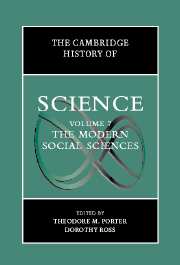Book contents
- Frontmatter
- 1 Introduction: Writing the History of Social Science
- PART I SCIENCES OF THE SOCIAL TO THE LATE NINETEENTH CENTURY
- PART II THE DISCIPLINES IN WESTERN EUROPE AND NORTH AMERICA SINCE ABOUT 1880
- PART III THE INTERNATIONALIZATION OF THE SOCIAL SCIENCES
- PART IV SOCIAL SCIENCE AS DISCOURSE AND PRACTICE IN PUBLIC AND PRIVATE LIFE
- 30 The Uses of the Social Sciences
- 31 Managing the Economy
- 32 Management and Accounting
- 33 Polling in Politics and Industry
- 34 Social Science and Social Planning During the Twentieth Century
- 35 Social Welfare
- 36 Education
- 37 The Culture of Intelligence
- 38 Psychologism and the Child
- 39 Psychiatry
- 40 Gender
- 41 Race and The Social Sciences
- 42 Cultural Relativism
- 43 Modernization
- Index
- References
31 - Managing the Economy
from PART IV - SOCIAL SCIENCE AS DISCOURSE AND PRACTICE IN PUBLIC AND PRIVATE LIFE
Published online by Cambridge University Press: 28 March 2008
- Frontmatter
- 1 Introduction: Writing the History of Social Science
- PART I SCIENCES OF THE SOCIAL TO THE LATE NINETEENTH CENTURY
- PART II THE DISCIPLINES IN WESTERN EUROPE AND NORTH AMERICA SINCE ABOUT 1880
- PART III THE INTERNATIONALIZATION OF THE SOCIAL SCIENCES
- PART IV SOCIAL SCIENCE AS DISCOURSE AND PRACTICE IN PUBLIC AND PRIVATE LIFE
- 30 The Uses of the Social Sciences
- 31 Managing the Economy
- 32 Management and Accounting
- 33 Polling in Politics and Industry
- 34 Social Science and Social Planning During the Twentieth Century
- 35 Social Welfare
- 36 Education
- 37 The Culture of Intelligence
- 38 Psychologism and the Child
- 39 Psychiatry
- 40 Gender
- 41 Race and The Social Sciences
- 42 Cultural Relativism
- 43 Modernization
- Index
- References
Summary
Since the eighteenth century, economic science has been punctuated by debates on the relation between state and market. Its history has been marked by a succession of doctrines and political constellations, more or less interrelated. They have usually been understood historically in relation to dominant ideas and institutional practices: mercantilism, planism, liberalism, the welfare state, Keynesianism, and neoliberalism. Whatever their dominant orientations, the various states gradually constructed systems of statistical observation. Yet the development of these statistical systems has generally been presented as a sort of inevitable and univocal progress, having little relation to the evolution of the variegated doctrines and practices of state direction and guidance of the economy. The historiography of economic thought, or more precisely, historical works dealing with the reciprocal interactions between the state and economic knowledge, has placed little emphasis upon the modes of statistical description specific to various historical configurations of state and market. In a word, these two histories, that of political economy and that of statistics, are rarely presented, much less problematized, together.
The reason for this gap in economic historiography is simple. Statistics has historically been perceived as an instrument, a subordinate methodology, a technical tool providing empirical validation for economic research and its political extensions. According to this “Whig” conception of the progress of science and its applications, statistics (understood as the production both of information and of the mathematical tools used to analyze that information) progresses autonomously relative to economic doctrine and practice. It is for this reason that the historical specificity of statistics is neglected in the historiography of economic science, and left unproblematized.
- Type
- Chapter
- Information
- The Cambridge History of Science , pp. 553 - 564Publisher: Cambridge University PressPrint publication year: 2003
References
- 25
- Cited by



